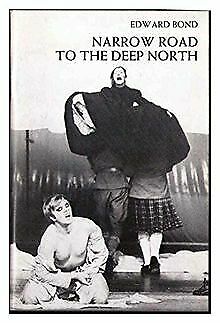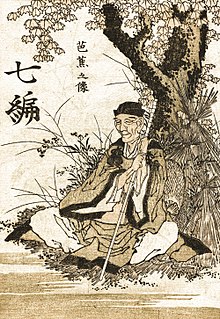
Matsuo Bashō, born Matsuo Kinsaku, then Matsuo Chūemon Munefusa, was the most famous poet of the Edo period in Japan. During his lifetime, Bashō was recognized for his works in the collaborative haikai no renga form; today, after centuries of commentary, he is recognized as the greatest master of haiku. He is also well known for his travel essays beginning with Records of a Weather-Exposed Skeleton (1684), written after his journey west to Kyoto and Nara. Matsuo Bashō's poetry is internationally renowned, and, in Japan, many of his poems are reproduced on monuments and traditional sites. Although Bashō is famous in the West for his hokku, he himself believed his best work lay in leading and participating in renku. He is quoted as saying, "Many of my followers can write hokku as well as I can. Where I show who I really am is in linking haikai verses."

The Black Watch, 3rd Battalion, Royal Regiment of Scotland is an infantry battalion of the Royal Regiment of Scotland. The regiment was created as part of the Childers Reforms in 1881, when the 42nd Regiment of Foot was amalgamated with the 73rd (Perthshire) Regiment of Foot. It was known as The Black Watch from 1881 to 1931 and The Black Watch from 1931 to 2006. Part of the Scottish Division for administrative purposes from 1967, it was the senior Highland regiment. It has been part of the Scottish, Welsh and Irish Division for administrative purposes from 2017.
This article contains information about the literary events and publications of 1702.

Oku no Hosomichi, translated as The Narrow Road to the Deep North and The Narrow Road to the Interior, is a major work of haibun by the Japanese poet Matsuo Bashō, considered one of the major texts of Japanese literature of the Edo period. The first edition was published posthumously in 1702.
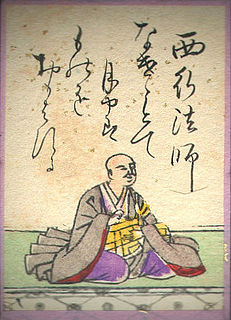
Saigyō Hōshi was a famous Japanese poet of the late Heian and early Kamakura period.
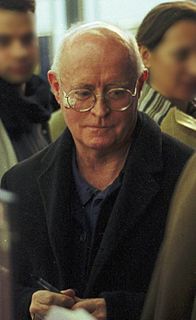
Edward Bond is an English playwright, theatre director, poet, theorist and screenwriter. He is the author of some fifty plays, among them Saved (1965), the production of which was instrumental in the abolition of theatre censorship in the UK. Other well-received works include Narrow Road to the Deep North (1968), Lear (1971), The Sea (1973), The Fool (1975), Restoration (1981), and the War trilogy (1985). Bond is broadly considered among the major living dramatists but he has always been and remains highly controversial because of the violence shown in his plays, the radicalism of his statements about modern theatre and society, and his theories on drama.

Lear is a 1971 three-act play by the British dramatist Edward Bond. It is a rewrite of William Shakespeare's King Lear. The play was first produced at the Royal Court Theatre in 1971, featuring Harry Andrews in the title role. It was revived by the Royal Shakespeare Company in 1982 with Bob Peck, and revived again at the Crucible Theatre, Sheffield, in 2005 with Ian McDiarmid.
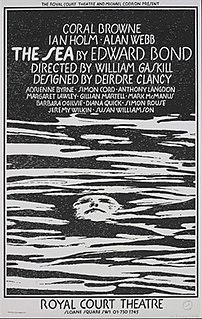
The Sea is a 1973 play by Edward Bond. It is a comedy set in a small seaside village in rural East Anglia during the Edwardian period and draws from some of the themes of Shakespeare's The Tempest. It was well-received by critics.

Baudin's black cockatoo, also known as Baudin's cockatoo or the long-billed black cockatoo, is a species of genus Zanda found in southwest Australia. The epithet commemorates the French explorer Nicolas Baudin. It has a short crest on the top of its head, and the plumage is mostly greyish black. It has prominent white cheek patches and a white tail band. The body feathers are edged with white giving a scalloped appearance. Adult males have a dark grey beak and pink eye-rings. Adult females have a bone coloured beak, grey eye-rings and ear patches that are paler than those of the males.
Haikai may refer in both Japanese and English to haikai no renga (renku), a popular genre of Japanese linked verse, which developed in the sixteenth century out of the earlier aristocratic renga. It meant "vulgar" or "earthy", and often derived its effect from satire and puns, though "under the influence of [Matsuo] Bashō (1644–1694) the tone of haikai no renga became more serious". "Haikai" may also refer to other poetic forms that embrace the haikai aesthetic, including haiku and senryū, haiga, and haibun. However, haikai does not include orthodox renga or waka.

Early Morning is a surrealist farce by the English dramatist Edward Bond. It was first produced in 1968, opening on 31 March at the Royal Court Theatre, directed by William Gaskill. The play takes place in a contorted version of the court of Queen Victoria who is portrayed as a lesbian. Her two sons are made conjoined twins. This made the play extremely scandalous, as did a scene in which the character Len eats another person standing in a queue in front of him. Like Bond's earlier play Saved (1965), it was initially condemned but later came to be viewed positively.
Nationality words link to articles with information on the nation's poetry or literature.
Nationality words link to articles with information on the nation's poetry or literature.

The Fool: Scenes of Bread and Love is a play by the English playwright Edward Bond. It traces the life of the poet John Clare against the backdrop of the Industrial Revolution, from his roots in rural East Anglia via literary success in London to his final years in a lunatic asylum. The play was first performed at the Royal Court Theatre in 1975, in a production directed by Peter Gill and featuring a cast including Tom Courtenay, David Troughton and Nigel Terry among others.
Kusamakura is a Japanese novel by Natsume Sōseki published in 1906. It appeared first in English in 1965 as The Three-cornered World, and in another translation in 2008 as Grass Pillow, a phrase which has connotations of travel in Japanese.
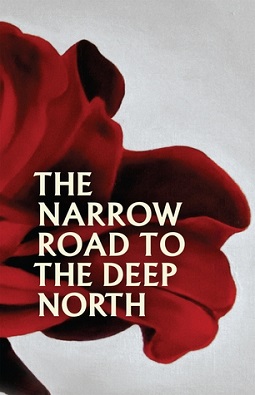
The Narrow Road to the Deep North is the sixth novel by Richard Flanagan, and was the 2014 winner of the Man Booker Prize.

Benkei on the Bridge is a Japanese Noh play from the 15th Century, by Hiyoshi Sa-ami Yasukiyo.
Matsunaga Teitoku (1570-1653) was a haiku writer, considered by R H Blyth to be the most important of Matsuo Bashō's predecessors.
Nozarashi Kikō (野ざらし紀行), variously translated as The Records of a Weather-Exposed Skeleton or Travelogue of Weather-Beaten Bones, is the first travel journal haibun by the Japanese poet Matsuo Bashō. Written in the summer of 1684, the work covers Bashō's journey. According to translator Nobuyuki Yuasa, it is "the first work of Bashō where we find glimpses of his mature style."
Kashima Kikō (, variously translated as Kashima Journal or A Visit to Kashima Shrine is a haibun travel journal by the Japanese poet Matsuo Bashō, covering his short journey to Kashima Shrine in the Kantō region. According to write-translator David Landis Barnhill, the Kashima Kikō is "most significant for the amusing but complex self-image near the beginning" where Bashō compares his companions to a bird and a mouse before calling himself a mixture of both: a bat.
